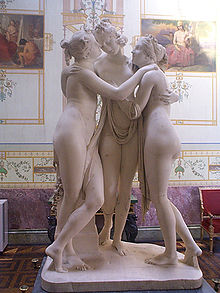
In Greek mythology, Aglaea (/əˈɡliːə/) or Aglaia (/əˈɡlaɪə/; Ancient Greek: Ἀγλαΐα, lit. 'festive radiance') is a goddess, one of the Graces (Charites), also called the Gratiae in Roman mythology.
Family
According to Hesiod and other sources (including Apollodorus), Aglaea was one of the three Charites, along with Euphrosyne (mirth) and Thalia (abundance), who were the daughters of Zeus and the Oceanid Eurynome. Other sources name the same three Charites (Aglaea, Euphrosyne and Thalia) but give them different parents. The Orphic Hymn to the Graces says they are the daughters of Zeus and Eunomia (goddess of good order and lawful conduct), and Pindar says that they are daughters of the strongest god (i.e. Zeus) without naming their mother. Hesiod says also that Aglaea is the youngest of the Charites.
According to the Dionysiaca, Aglaea is one of the "dancers of Orchomenus" (i.e. the Charites, per Pindar), along with Pasithea and Peitho, who attend Aphrodite. When Aphrodite jealously attempts to weave better than Athena, the Charites help her do so, with Aglaea passing her the yarn. Aglaea also acts as Aphrodite's messenger, and is sent to find and bring a message to Eros, who travels back to Aphrodite much faster because he can fly whereas Aglaea cannot. Aglaea here is referred to as a Charis (singular of Charites), but other characters not of this group are also named Charis, including by Aglaea.
Hesiod says that Aglaea was married to Hephaestus. (This is often seen as after his divorce from Aphrodite.) The Orphic Fragments compiled by Otto Kern say that by Hephaestus, Aglaea became mother of Eucleia ("Good Repute"), Eupheme ("Acclaim"), Euthenia ("Prosperity"), and Philophrosyne ("Welcome"). The Iliad and Dionysiaca refer to the wife of Hephaestus as Charis, and some scholars conclude that these references refer to Aglaea.
Notes
- ^ Brill's New Pauly, s.v. Aglaea (1).
- Hesiod, Theogony 907
- Apollodorus, 1.3.1.
- ^ Bell, s.v. Aglaia (1), p. 15.
- Brill's New Pauly, s.v. Charites (Graces).
- Orphic Hymn (60), 2–3.
- ^ Pindar, Olympian Ode 14.1–20.
- ^ Hesiod, Theogony 945.
- Hard, pp. 167, 208
- Smith, s.v. Charis
- Nonnus, Dionysiaca 24.254 ff.
- Nonnus, Dionysiaca 33.51 ff.
- Orphic fr. 182 Kern, p. 213 (English translation).
- Homer, Iliad 18.382–385
- Nonnus, Dionysiaca 29.317
References
- Apollodorus, The Library with an English Translation by Sir James George Frazer, F.B.A., F.R.S. in 2 Volumes, Cambridge, MA, Harvard University Press; London, William Heinemann Ltd. 1921. ISBN 0-674-99135-4. Online version at the Perseus Digital Library. Greek text available from the same website.
- Bell, Robert E., Women of Classical Mythology: A Biographical Dictionary, ABC-Clio, 1991. ISBN 978-0-874-36581-8. Internet Archive.
- Brill’s New Pauly: Encyclopaedia of the Ancient World. Antiquity, Volume 1, A-Ari, editors: Hubert Cancik, Helmuth Schneider, Brill, 2002. ISBN 978-90-04-12258-1. Online version at Brill.
- Grimal, Pierre, The Dictionary of Classical Mythology, Wiley-Blackwell, 1996. ISBN 978-0-631-20102-1. Internet Archive.
- Hard, Robin, The Routledge Handbook of Greek Mythology: Based on H.J. Rose's "Handbook of Greek Mythology", Psychology Press, 2004. ISBN 978-0-415-18636-0. Google Books.
- Hesiod, Theogony from The Homeric Hymns and Homerica with an English Translation by Hugh G. Evelyn-White, Cambridge, MA.,Harvard University Press; London, William Heinemann Ltd. 1914. Online version at the Perseus Digital Library.
- Kern, Otto, Orphicorum Fragmenta, Berlin, 1922. Scans at the Internet Archive, English translation at HellenicGods.org.
- Nonnus of Panopolis, Dionysiaca translated by William Henry Denham Rouse (1863–1950), from the Loeb Classical Library, Cambridge, MA, Harvard University Press, 1940. Online version at the Topos Text Project.
- Pindar, Odes translated by Diane Arnson Svarlien. 1990. Online version at the Perseus Digital Library.
- Pindar, The Odes of Pindar including the Principal Fragments with an Introduction and an English Translation by Sir John Sandys, Litt.D., FBA. Cambridge, MA., Harvard University Press; London, William Heinemann Ltd. 1937. Greek text available at the Perseus Digital Library.
- Smith, William; Dictionary of Greek and Roman Biography and Mythology, London (1873). "Charis".
| Ancient Greek deities | |||||||||||||
|---|---|---|---|---|---|---|---|---|---|---|---|---|---|
| Early deities | |||||||||||||
| Titans |
| ||||||||||||
| Olympian deities |
| ||||||||||||
| Water deities |
| ||||||||||||
| Personifications |
| ||||||||||||
| Other deities |
| ||||||||||||